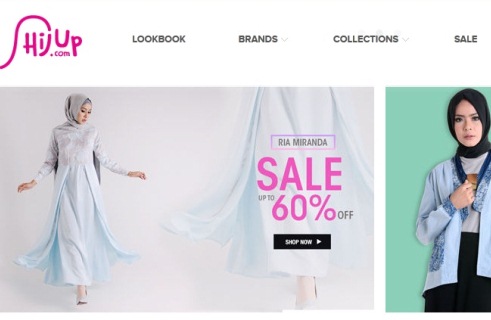

By: todayonline
Source: TodayOnline
Indonesia may be experiencing its slowest pace of economic growth in five years, but you would not know it by looking at all the interest garnered by HijUp.com.
An online retailer of Islamic fashion, HijUp last week received an undisclosed amount of seed funding from Emtek Group, Fenox Venture Capital and 500 Startups.
“In Indonesia, online shopping is not something new anymore, because it’s supported by a rather massive Internet user base,” said Ms Diajeng Lestari, HijUp’s chief executive.
She added that by “mixing faith and fashion”, HijUp hopes to turn Jakarta into a global capital of Islamic fashion.
Operating on a much larger scale is Lippo Group’s MatahariMall.com, an e-commerce site named after the conglomerate’s department store chain.
Earlier this year, Lippo appointed Credit Suisse and Bank of America to lead its first round of financing to raise US$200 million (S$275 million), as it bids to turn MatahariMall.com into “the Alibaba of Indonesia”.
The amount of funding pouring into Indonesia’s fledgling e-commerce scene belies the general economic sputtering that has seen the country post its slowest pace of quarterly gross domestic product growth in five years, at 4.7 per cent in the January-to-March period.
That boon, wrote Mr Gary Khoeng in Convergence Ventures, a technology venture fund that invests in early-stage Indonesian enterprises, is due to an ever-expanding Internet user base.
“According to an e-commerce report by Singapore Post, Indonesia commanded between 70 and 80 million Internet users this year, growing at 20 per cent year-on-year until 2016,” Mr Khoeng said.
“This is more than 30 per cent Internet penetration, double the rate several years ago,” he added.
Citing data from New York-based eMarketer, Mr Khoeng wrote that the number of online shoppers in Indonesia is expected to grow to 7.4 million this year and possibly increase to 8.7 million in 2016.
As the fourth-most-populous country in the world, Indonesia has long been a key market for retailers, with online shopping taking off in recent years as the country’s Internet-connected middle class swells.
The Indonesian consuming class is expected to grow to 90 million by 2030, according to business consultancy McKinsey.
For entrepreneurs such as HijUp’s Ms Diajeng, it is clear where the business opportunity online lies. “We’re targeting the middle class,” she said.
Ms Ignes Messtya, a representative for MatahariMall.com, said the company is casting its net wider, targeting those beyond the usual urban consumer who typifies the online-shopping crowd.
“(Online shopping) is especially convenient for people who live on the outskirts of Jakarta,” she said. “There are various prices and it’s targeted at everyone in Indonesia.”
A major obstacle that e-commerce operators have identified early on is the limited range of payment options that most Indonesian online shoppers are willing to use — either cash on delivery or bank transfer. “The payment system (preference) is still relatively manual,” said Ms Diajeng.
Ms Ignes said MatahariMall.com has come up against the same challenge. “Consumers prefer cash on delivery. Gaining consumers’ trust is difficult,” she said.
Online fraud is rife in the various e-commerce forums and marketplaces that have sprouted up in recent years, and solutions that have been devised include the use of escrow accounts set up by site administrators, as well as ranking systems for sellers.
MatahariMall.com has devised its own system — the first in the country — where shoppers would order their goods online, then go to one of the company’s physical stores to pick up the items and pay.



